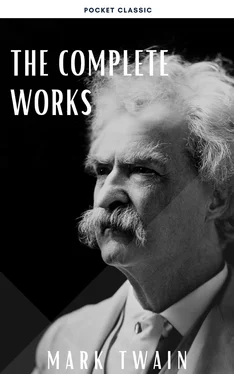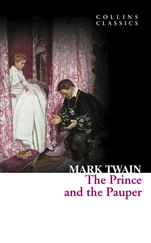But hunger and wretchedness rise superior to fears in the long run. Another tedious wait at the spring and another long sleep brought changes. The children awoke tortured with a raging hunger. Tom believed that it must be Wednesday or Thursday or even Friday or Saturday, now, and that the search had been given over. He proposed to explore another passage. He felt willing to risk Injun Joe and all other terrors. But Becky was very weak. She had sunk into a dreary apathy and would not be roused. She said she would wait, now, where she was, and die — it would not be long. She told Tom to go with the kite-line and explore if he chose; but she implored him to come back every little while and speak to her; and she made him promise that when the awful time came, he would stay by her and hold her hand until all was over.
Tom kissed her, with a choking sensation in his throat, and made a show of being confident of finding the searchers or an escape from the cave; then he took the kite-line in his hand and went groping down one of the passages on his hands and knees, distressed with hunger and sick with bodings of coming doom.
Tuesday afternoon came, and waned to the twilight. The village of St. Petersburg still mourned. The lost children had not been found. Public prayers had been offered up for them, and many and many a private prayer that had the petitioner's whole heart in it; but still no good news came from the cave. The majority of the searchers had given up the quest and gone back to their daily avocations, saying that it was plain the children could never be found. Mrs. Thatcher was very ill, and a great part of the time delirious. People said it was heartbreaking to hear her call her child, and raise her head and listen a whole minute at a time, then lay it wearily down again with a moan. Aunt Polly had drooped into a settled melancholy, and her gray hair had grown almost white. The village went to its rest on Tuesday night, sad and forlorn. Away in the middle of the night a wild peal burst from the village bells, and in a moment the streets were swarming with frantic half-clad people, who shouted, "Turn out! turn out! they're found! they're found!" Tin pans and horns were added to the din, the population massed itself and moved toward the river, met the children coming in an open carriage drawn by shouting citizens, thronged around it, joined its homeward march, and swept magnificently up the main street roaring huzzah after huzzah!
The village was illuminated; nobody went to bed again; it was the greatest night the little town had ever seen. During the first half-hour a procession of villagers filed through Judge Thatcher's house, seized the saved ones and kissed them, squeezed Mrs. Thatcher's hand, tried to speak but couldn't — and drifted out raining tears all over the place.
Aunt Polly's happiness was complete, and Mrs. Thatcher's nearly so. It would be complete, however, as soon as the messenger dispatched with the great news to the cave should get the word to her husband. Tom lay upon a sofa with an eager auditory about him and told the history of the wonderful adventure, putting in many striking additions to adorn it withal; and closed with a description of how he left Becky and went on an exploring expedition; how he followed two avenues as far as his kite-line would reach; how he followed a third to the fullest stretch of the kite-line, and was about to turn back when he glimpsed a far-off speck that looked like daylight; dropped the line and groped toward it, pushed his head and shoulders through a small hole, and saw the broad Mississippi rolling by! And if it had only happened to be night he would not have seen that speck of daylight and would not have explored that passage any more! He told how he went back for Becky and broke the good news and she told him not to fret her with such stuff, for she was tired, and knew she was going to die, and wanted to. He described how he labored with her and convinced her; and how she almost died for joy when she had groped to where she actually saw the blue speck of daylight; how he pushed his way out at the hole and then helped her out; how they sat there and cried for gladness; how some men came along in a skiff and Tom hailed them and told them their situation and their famished condition; how the men didn't believe the wild tale at first, "because," said they, "you are five miles down the river below the valley the cave is in" — then took them aboard, rowed to a house, gave them supper, made them rest till two or three hours after dark and then brought them home.
Before day-dawn, Judge Thatcher and the handful of searchers with him were tracked out, in the cave, by the twine clews they had strung behind them, and informed of the great news.
Three days and nights of toil and hunger in the cave were not to be shaken off at once, as Tom and Becky soon discovered. They were bedridden all of Wednesday and Thursday, and seemed to grow more and more tired and worn, all the time. Tom got about, a little, on Thursday, was down-town Friday, and nearly as whole as ever Saturday; but Becky did not leave her room until Sunday, and then she looked as if she had passed through a wasting illness.
Tom learned of Huck's sickness and went to see him on Friday, but could not be admitted to the bedroom; neither could he on Saturday or Sunday. He was admitted daily after that, but was warned to keep still about his adventure and introduce no exciting topic. The Widow Douglas stayed by to see that he obeyed. At home Tom learned of the Cardiff Hill event; also that the "ragged man's" body had eventually been found in the river near the ferry-landing; he had been drowned while trying to escape, perhaps.
About a fortnight after Tom's rescue from the cave, he started off to visit Huck, who had grown plenty strong enough, now, to hear exciting talk, and Tom had some that would interest him, he thought. Judge Thatcher's house was on Tom's way, and he stopped to see Becky. The Judge and some friends set Tom to talking, and some one asked him ironically if he wouldn't like to go to the cave again. Tom said he thought he wouldn't mind it. The Judge said:
"Well, there are others just like you, Tom, I've not the least doubt. But we have taken care of that. Nobody will get lost in that cave any more."
"Why?"
"Because I had its big door sheathed with boiler iron two weeks ago, and triple-locked — and I've got the keys."
Tom turned as white as a sheet.
"What's the matter, boy! Here, run, somebody! Fetch a glass of water!"
The water was brought and thrown into Tom's face.
"Ah, now you're all right. What was the matter with you, Tom?"
"Oh, Judge, Injun Joe's in the cave!"
Within a few minutes the news had spread, and a dozen skiff-loads of men were on their way to McDougal's cave, and the ferryboat, well filled with passengers, soon followed. Tom Sawyer was in the skiff that bore Judge Thatcher. When the cave door was unlocked, a sorrowful sight presented itself in the dim twilight of the place. Injun Joe lay stretched upon the ground, dead, with his face close to the crack of the door, as if his longing eyes had been fixed, to the latest moment, upon the light and the cheer of the free world outside. Tom was touched, for he knew by his own experience how this wretch had suffered. His pity was moved, but nevertheless he felt an abounding sense of relief and security, now, which revealed to him in a degree which he had not fully appreciated before how vast a weight of dread had been lying upon him since the day he lifted his voice against this bloody-minded outcast.
Injun Joe's bowie-knife lay close by, its blade broken in two. The great foundation-beam of the door had been chipped and hacked through, with tedious labor; useless labor, too, it was, for the native rock formed a sill outside it, and upon that stubborn material the knife had wrought no effect; the only damage done was to the knife itself. But if there had been no stony obstruction there the labor would have been useless still, for if the beam had been wholly cut away Injun Joe could not have squeezed his body under the door, and he knew it. So he had only hacked that place in order to be doing something — in order to pass the weary time — in order to employ his tortured faculties. Ordinarily one could find half a dozen bits of candle stuck around in the crevices of this vestibule, left there by tourists; but there were none now. The prisoner had searched them out and eaten them. He had also contrived to catch a few bats, and these, also, he had eaten, leaving only their claws. The poor unfortunate had starved to death. In one place, near at hand, a stalagmite had been slowly growing up from the ground for ages, builded by the water-drip from a stalactite overhead. The captive had broken off the stalagmite, and upon the stump had placed a stone, wherein he had scooped a shallow hollow to catch the precious drop that fell once in every three minutes with the dreary regularity of a clock-tick — a dessertspoonful once in four and twenty hours. That drop was falling when the Pyramids were new; when Troy fell; when the foundations of Rome were laid when Christ was crucified; when the Conqueror created the British empire; when Columbus sailed; when the massacre at Lexington was "news." It is falling now; it will still be falling when all these things shall have sunk down the afternoon of history, and the twilight of tradition, and been swallowed up in the thick night of oblivion. Has everything a purpose and a mission? Did this drop fall patiently during five thousand years to be ready for this flitting human insect's need? and has it another important object to accomplish ten thousand years to come? No matter. It is many and many a year since the hapless half-breed scooped out the stone to catch the priceless drops, but to this day the tourist stares longest at that pathetic stone and that slow-dropping water when he comes to see the wonders of McDougal's cave. Injun Joe's cup stands first in the list of the cavern's marvels; even "Aladdin's Palace" cannot rival it.
Читать дальше










